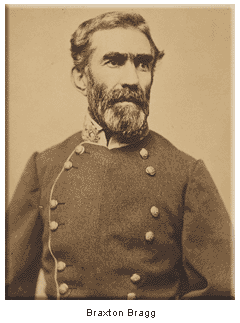Braxton Bragg was born in Warrenton, North Carolina, on March 22, 1817, and graduated from 3616:West Point] in 1837. He served in the Second Seminole War and the Mexican War where he was promoted for valor displayed at the Battle of Buena Vista. Bragg retired from the service in 1856 and devoted his attentions to his plantation in Louisiana.
 When Civil War broke out in 1861, Bragg was appointed a brigadier-general in the Confederate Army with responsibility for the Gulf Coast. In 1862 he was assigned to a command under Albert Sydney Johnston and fought at Shiloh. Bragg replaced Johnston after his death.
In June 1862, Bragg headed the Army of Tennessee, replacing P.G.T. Beauregard. The incursion into Kentucky in August met with initial success, but was turned into failure at Perryville in October. Late in the year Bragg’s forces fought to a draw at Murfreesboro, but retreated southward in early 1863.
In the fall of 1863, Bragg managed to surprise Union forces at the Battle of Chickamauga, but ignored the advice of subordinates who urged immediate pursuit of the enemy. In November 1863, Bragg was decisively defeated at the Battle of Chattanooga by Union soldiers under U.S. Grant. Bragg was removed from his command.
Bragg finished out the war as an advisor to Jefferson Davis in Richmond, then later as an observer of the Confederate efforts against William T. Sherman in Georgia.
In the postwar period Bragg served as a civil engineer in both Alabama and Texas. He died at Galveston, Texas, on September 27, 1876.
Braxton Bragg was one of the most controversial Confederate commanders. He displayed excellent skills in organizing and training soldiers, but was slow to capitalize on the enemy's setbacks. Bragg also was not effective in dealing with his subordinates. His relationship with Jefferson Davis kept him in command longer than the results warranted.
When Civil War broke out in 1861, Bragg was appointed a brigadier-general in the Confederate Army with responsibility for the Gulf Coast. In 1862 he was assigned to a command under Albert Sydney Johnston and fought at Shiloh. Bragg replaced Johnston after his death.
In June 1862, Bragg headed the Army of Tennessee, replacing P.G.T. Beauregard. The incursion into Kentucky in August met with initial success, but was turned into failure at Perryville in October. Late in the year Bragg’s forces fought to a draw at Murfreesboro, but retreated southward in early 1863.
In the fall of 1863, Bragg managed to surprise Union forces at the Battle of Chickamauga, but ignored the advice of subordinates who urged immediate pursuit of the enemy. In November 1863, Bragg was decisively defeated at the Battle of Chattanooga by Union soldiers under U.S. Grant. Bragg was removed from his command.
Bragg finished out the war as an advisor to Jefferson Davis in Richmond, then later as an observer of the Confederate efforts against William T. Sherman in Georgia.
In the postwar period Bragg served as a civil engineer in both Alabama and Texas. He died at Galveston, Texas, on September 27, 1876.
Braxton Bragg was one of the most controversial Confederate commanders. He displayed excellent skills in organizing and training soldiers, but was slow to capitalize on the enemy's setbacks. Bragg also was not effective in dealing with his subordinates. His relationship with Jefferson Davis kept him in command longer than the results warranted.